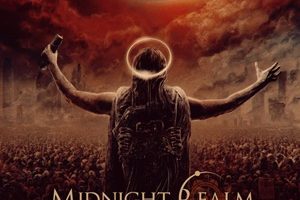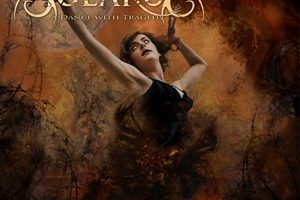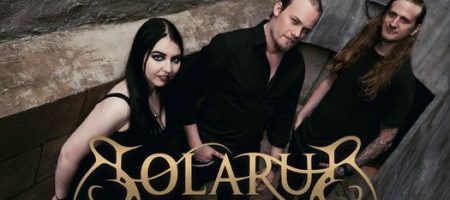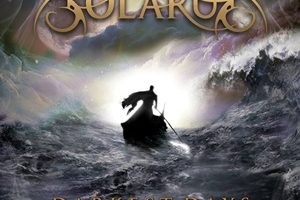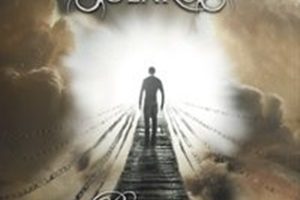Solarus – Triumph Through Tragedy
Tuesday, 4th January 2022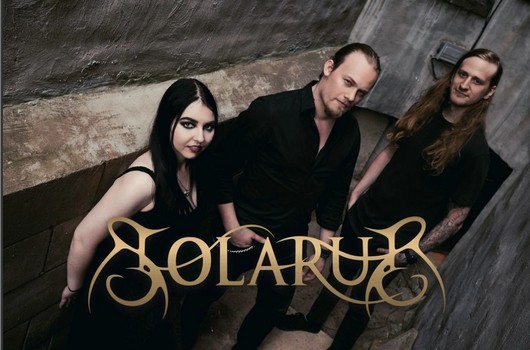
Canada has an immense multitude of talent across the metal spectrum – Solarus being one of the best acts when you want soaring melodic power metal with progressive, modern, and symphonic aspects. Continuing to carve their own path as an independent act, their third album A Dance with Tragedy elevates their songwriting, performances, and style to another level. We felt the need to catch up on everything related to the band – so we reached out to guitarist Lucas MacArthur and vocalist Sarah Dee for this fascinating conversation.
You’ll learn more about the band’s songwriting process, specific highlights and influences for certain songs on the new record, video stories, live performance thoughts, new hobbies or insights that came to light during the pandemic, plus future plans.
Dead Rhetoric: The third Solarus album is A Dance with Tragedy. Can you discuss the development of this material, the recording/production process, and how the changes with the current rhythm section plus COVID-19 shaped the output in comparison to your previous discography?
Sarah Dee: I’ll start with the first part of your question in regard to the production process and how the album was made, and how it differed from our sort of preexisting processes. A lot of our songwriting started remotely at a distance because I live about three hours away from the band in London, I live across and up so a lot of the songwriting is done semi-distanced. This time around, Lucas typically writes the instrumentals and sets up the musical underpinning of the album. I listen to it, we send it and collaborate on the direction we want the album to go, how we see things working. Often times, we collaborate on the vocals, or I’ll write the lyrics and then work on the vocals. That’s sort of how we do it. Once we have everything written, we go to our producer (Sean Dowell) who is actually my partner he lives with me. I saunter over into the other room, and we get the production stage going. It’s been roughly the same. The only difference this time around is the timeline was stretched much further out. Lucas was able to come here to record his parts in person.
Prior to COVID-19 it wasn’t much different. This time Lucas could record his parts live. I record my vocals at home. In terms of differences, the album has been more of a collaborative process. Working together on really trying to find strategic areas where we can grow and not stick to the same formula. How can we incorporate new musical textures? How can we work on new lyrical concepts that are pushing us forward instead of turning up the same thing?
Lucas MacArthur: The biggest differences were I learned a lot from the last two albums when it came to writing the instrumentals. I took on a much heavier role, writing all the instrumentation instead of just the guitars and relying on the expertise of session musicians and producers to help Solarus grow into that full sound. This time around, it was a very much do it yourself recording process as well as a do it yourself writing process. When Sarah got the album, it was pretty instrumentally complete. Which is always nice for a singer to work with (laughs). You have the full sonic landscape there.
Dead Rhetoric: You have a new rhythm section in the band. How did those changes come about, and what did they add to the table on this record?
MacArthur: Yes, that is true. Truth be told, the new album was written before our new bassist and drummer were recruited into the band. That didn’t have as much bearing on the initial writing process. Things may have been tweaked afterward as we were adjusting things based on capabilities, suggestions, that kind of thing. All in all, the vast majority of this album was written by Sarah and I, and then Troy provided some guitar work on the side for miscellaneous guitar solos and what not. As far as recording the bulk of the rhythm section, it was mostly a singular vision on my part. We’ll see if that stays the same for the next album, we haven’t had a lineup stay consistent for it to be that way, we will have to see for the future.
Dead Rhetoric: The title track has a special guest appearance from Vicky Psarakis of The Agonist. Did you have her specifically in mind for this song, and has she been a musician you’ve kept an eye on over the years through her work with that band (and others)?
Dee: It was pretty cool. I have known of The Agonist and listened to their music for quite a while. The relationship started with them when we got the chance to open for them at Lee’s Palace. This was about a year before COVID-19 started. We got to chat with them and became friends with some of the members of the band, Vicky included. At that point, we were sort of thinking of our next album, things started to come into play. We spoke about this song we were working on, the title track, would be a great place to include Vicky. We got a great vibe from her, she’s an awesome musician. She was stoked to work with us as well. We took some time, collaborated on the song.
Dead Rhetoric: Where did you want to come across with the lyrics for this album – are there specific elements that you take from personal events/situations that have happened in your life, and do you ever get feedback from the fans on how your lyrics have affected them?
Dee: As far as the lyrics, there (are) definitely influences that come in with my personal life. I do have inspiration from everything around me, including things in my life. However, I try to be intentionally vague when it comes to discussing specific lyrics because I understand that everyone is going to take something from the lyrics that is going to mean something personally to them. That is why I try to tie things back to a concept, to keep my ideas organized.
As far as the fans sort of connecting to lyrics, something recently (happened) that I was not actually expecting. We had a show recently at the Rockpile and we performed “Holding On”. My childhood friend had left us, suddenly and tragically, and I wrote that song about her and her passing. I initially didn’t expect that song to resonate with a lot of people because I knew it was written about something very personal that happened to me and to her family. After that show, people came up to me and since messaged me saying that was incredible, the song is incredible, it made me feel something and I could relate to it. People started sharing stories with me, it was very surprising. The song, being very emotionally vulnerable for me, seeing it resonate with so many people.
Dead Rhetoric: What can you tell us regarding the video shoot for “Guiding Light”? Was this an obvious choice from the album to make a visual clip for, and were there any specific surprises, challenges, or funny stories that took place during the making of the video?
MacArthur: The thing that determined using that song as a single from a practical standpoint was it was the most complete song we had at the time. That video was filmed quite a long time ago, our hair is a little longer than it was at the time of the video (laughs). It was the one that had the vision very solidified, and it hasn’t changed since. On the other hand, we approached that song having an open mind about the aesthetic. We didn’t have a specific vision to hold ourselves to. It just so happened that one of my relatives had a big property on the back of their farmland with a large brush pile that he sent aflame, as people do on the countryside. With a “Guiding Light”, a lyric in the song regarding flames, we thought let’s give this a shot.
Funny things about the day. About halfway through our second take the pile had burned so fast it was basically just smoldering – the inconsistency of the flame in the video behind us. It was a fun shoot, very cold, aesthetically beautiful, pretty much what a video shoot is all the time.
Dee: Yeah, okay. This is a good story. There is a shot of me in the video where I am standing on this dock, seeing the wind blowing at me, a side profile shot. If you can describe a moment as before the gram, as they say, this is that. It was later on in the day, very cold – all the boys had their jackets on, and I was sitting in the car trying to warm up because it was quite cold to be outside without a jacket on. Jeremy our videographer wanted to get this really good shot – I said to myself, it’s really cold. Let’s just do it, I am already cold, I thought I couldn’t get any colder. I was wrong. I did it for the shot for the video, but we are only doing this one time because it is so cold. I was so worried the shot wouldn’t turn out well, I was worried you would be able to see my hands shaking in the video. I had Jeremy not shoot too close to me so you couldn’t see me shivering. I did my very best to look like I wasn’t perishing in the cold. The take turned out really well. All the guys loved it, Lucas had this big blanket off camera, Troy had my coat. They tackled me at the end so I could get warmed up and bundled up again. People always comment on that shot.
Dead Rhetoric: How would you assess your development as a songwriter and a guitarist over the years? Where do you think your outlook has changed or grown – are there specific areas you feel you place more concentration and attention upon to get the best possible outcome in the end?
MacArthur: That’s a really good question. I’ve definitely grown, I can say that with confidence and objectivity. I used to write my songs in a way where I wore my influences on my sleeve because I was still at a young age as a songwriter. I’d say Darkest Days was a great steppingstone away from that, and working with Sarah on that album really helped. As far as this album goes, this album is a testament to how far I’ve come. Sarah and I decided that this album was going to be where I fulfilled this singular vision of a full-length album where the music had concepts, consistencies, melodies that drifted all the way through it. I’m very proud of this album. I can say without a doubt it is me at my most capable to date. Even just in individual songs. One song I am particularly proud of on this album is “Everbound”. It’s a very musically and technically challenging song to write, with several key changes, and interweaving melodic ideas that were introduced earlier on the album, coming back. Introducing melodic ideas that would appear in the song that followed. A heavy focus on conceptual instrumental writing on my end. I was in unventured territory, and I hope everyone enjoys this as much as I enjoyed writing it.
Dead Rhetoric: When it comes to your vocals Sarah, one of the things Lucas has mentioned to me before is the fact that it seems like on this record you challenged yourself more than the previous record. Including some surprises where you pulled off things he didn’t know you were capable of. How do you feel about your performance on this record?
Dee: I’m proud of my performance. I took a lot of time, going back to my classical roots. A lot of people don’t know that I am a classically trained singer. I was doing aria operas, musical theater, that is the basis for my training. I had it there, and I thought this might add a new sort of texture to things. I wanted to explore my voice a little more. The last couple of years, my voice has matured a little bit. I have focused on a hybrid technique that will allow me to switch between the more rock/metal register which is more forward and belty over to a more classical register which is more open with vibrato, smooth. COVID-19 gave me the time to really sit with my voice and really assess my tone and my style and take it to that next step further.
MacArthur: Something else that came up that’s really important in the process, which relates to your first question about how the writing of the album was different. Sarah and I had a lot of moments throughout the album where we encouraged each other to go back to the drawing board. We really pushed each other when we thought an idea was been there, done that. We tried our hardest to point out those moments where, it could be better. There were lots of moments where Sarah would sing in a spot that I didn’t anticipate, and other times she would sing in a spot where a lead was, and rethink things. Little examples like that resulted in this new methodology of working that I thought was developmental. We are happy we came out the other side as bandmates that are supportive of each other rather than at each other’s throats. We flexed some new muscles in the creation of this new album.
Dead Rhetoric: I agree. One of the songs that’s going to register strongly live is “The Keeper”. There is this midsection part that seems very pit friendly…
MacArthur: Among the band, it’s been said that “The Keeper” is probably peak Solarus to date. A couple of reviewers have said it’s their favorite song and favorite we have written to date. It was definitely a song that I struggled with. Originally it was a mid-paced track, that had a specific chord flow to it. Sarah said originally it was okay, and I wasn’t satisfied with that. Oddly I was listening to a lot of heavy bands at the time, Scar Symmetry, Meshuggah, lots of Swedish metal bands. The kind of bands that had this really heavy, percussive style. That really encouraged me to try something different. The middle part that is very pit friendly, it was intended that way, and we hope to get some Walls of Death going to that song. It’s probably the most technical song on the album – it’s fast and requires a lot of precision. A lot of dexterity on the instruments, and a lot of speed and stamina on the part of our drummer. It requires a ton of range from Sarah as a vocalist. It needed to be pleasing to the ears, and I think we accomplished that with this song.
Dead Rhetoric: When we last talked for Darkest Days, you had not played out as much live at that point. How would you say the band has grown as a live unit now that you have some more shows under your belt – where do you see the differences between the studio output and the stage for Solarus?
MacArthur: I would say just from a rehearsal standpoint, getting together on and off throughout the pandemic was challenging with new members. We recruited our new members based on what we thought their work ethic was going to be like. We really took our time, and we are really happy with our picks. We played our first show in the summertime at Ribfest, and we had a blast with them on stage. I personally think that it felt like we had been on stage with them for years at that point. It was effortless, we didn’t have to think too hard. That is something that Solarus has not previously tapped into. The live shows help enrich our performances. These new members really bring that to the table.
Dee: We are out there to enjoy ourselves, connect with people, and we are never disappointed. Having that mentality has really allowed us to embrace where we are and set really good goals as to where we want to be because we are in it to do the best performances that we can. There is also this added element of fun, lightheartedness that a lot of the times our audience really appreciates. I know I have had a few promoters say they love that as well.
Dead Rhetoric: Solarus continue to keep a self-released, DIY status when it comes to these releases. What factors would it take for the band to sign with a label at this point? Are you content to enjoy the freedom and abilities to promote your music on your own levels, at your own pace?
MacArthur: That’s always the question, isn’t it? We haven’t really actively pursued a label, and this is a tougher question to answer because you dangerously end up veering towards speaking for everyone else in the band. On the whole, I wouldn’t say it comes up in conversation a lot. We are not interested in seeing our names on a big banner in the big leagues. If it happens that would be amazing, all in all Solarus from the get go was always a passion project. Enough people out there liked what we are doing that it encouraged us to keep going. If an offer came our way, we would do what we’ve always done as a band: have everyone say their piece. We are emotional adults and people can acknowledge disagreeing about things with no personal harm in it. What it would take for a label to sign us? Offering us something that we don’t already have. It’s hard to find a reason to sign with a label when you feel so fulfilled doing what you are doing already. But, who knows what the future holds? We are three albums in. Statistically speaking, bands don’t tend to stay independent longer than that. We will just have to wait and see what happens in the future.
Dead Rhetoric: Considering the lengthy break from entertainment activities due to the pandemic/lockdown, did you develop any new hobbies, interests, or passions to keep you sane – or did you find you threw yourself even more into your musical endeavors? How do you think we will come out of this pandemic as a whole?
Dee: Definitely I want to say it’s a bit of both. I was able to explore music differently. I had more time to think about things. I had more time to reframe myself, and look to new inspirations to diversify myself, diversify my palate when it comes to music and bands I enjoy. I did pick up a hobby, for fun and necessity. I live on a farm and I tried my hand at some gardening, growing all kinds of fruits and vegetables at home. Just sort of reconnecting to nature, and that also helped this sort of musical side of things. It allowed me to be introspective, not rush and sit down with a thought and really see it through. Also with music concepts so it would bring the most justice to the instrumental I was singing over or the concept.
MacArthur: Since 2020, life has changed a lot for me. There was a lot of moving pieces all at once. Met my future wife at the beginning of it all, got engaged, moved away from home, moved to a smaller town from London. Hobby wise, I really have spent the better part of the last year and a half working on this album. This was my passion project that consumed a lot of my time. I wouldn’t say I developed any new hobbies, just broadened the one that already existed which is music. Whether that be writing more instrumentation for one album, hours spent on the phone with Sarah going over concepts, even expanding into the guest vocalist territory.
Without crystal balling it, the response to live shows, I would say people are ready to start getting back out there. Everyone is feeling the itch to see each other, see live music, do social things. I tend to think that the overall human tendency will win out in the end. People will gravitate to the way things were.
Dead Rhetoric: What have you been enjoying in the metal (or music world) when it comes to albums over the past year or so? Do you find you grab equal inspiration from other artists in your genre and things that are outside of metal when it comes to developing your tastes for Solarus?
MacArthur: As far as easy listening goes, there has been lots of stuff coming out that is great. Personal three albums from 2021 – Dream Theater – A View from the Top of the World, it was a monster of an album. I’m really digging The Agonist’s new EP. My personal favorite release this year has to go to Evergrey – Escape of the Phoenix. “The Keeper” as a song had a big influence from Meshuggah – a band I previously had not given a lot of time to.
Dee: It’s interesting. I listen to a very wide variety of music. I listen to music in foreign languages, a lot of international music, from all kinds of different places. This year during the pandemic it was a tale of two extremes. Early on in the pandemic I went through a Jinjer kick for a solid three months. I love the two newest Evergrey albums, The Atlantic and Escape of the Phoenix. It’s hard to say – I have a diverse playlist. I love Orphans by The Agonist. Their new EP is fantastic. Of course, Adele just released her new album. I love her, she’s fantastic. Billie Eilish sprinkled in there, I like to listen to a lot of Italian rock. I love Måneskin, they won Eurovision and they are a fantastic group. I have been more open-minded in terms of the artists and styles I listen to. I have K-pop and regular pop in there.
Dead Rhetoric: What does the next twelve months or so look like for Solarus in terms of promotion for this new record?
MacArthur: Who knows? We definitely have hit a good stride in terms of regular engagement. We all agreed that we went radio silent for a long time. With two members leaving and the pandemic hitting, people’s future was uncertain in the world. It did cross our minds that Solarus might not necessarily return, we didn’t want to do the typical thing that a band does which is soon, their worlds are going to be rocked. We have hit the stride of posting regularly and having content on social media for people. The next twelve months we will have more music videos, possibly a couple of cover songs. We are going to pull that trigger in 2022, and of course writing a new album. I have a bunch of material, not fully formed, but that’s always how it starts. I think the beginning of 2022 will also bring a nice relaxing break.
Dee: I feel like we are living in a time where the last eighteen months has been so unpredictable. I have lost this ability to think that far ahead. All I am thinking about is what is going to happen two or three months down the line. I don’t know if it’s a defense mechanism to think that far ahead or if it’s smart, it’s so hard to say. I want to write new music, I want to be happy, be around the people I enjoy the company of, perform, and I want to do things that are fulfilling. I welcome everyone that wants to join us on that journey.











